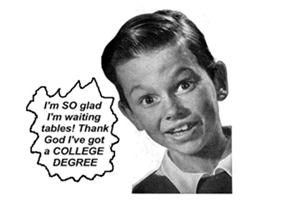Question
What is the dress code for men on job interviews, whether live or Zoom? Some people say you can never go wrong overdressing, others say you don’t want to look stodgy. One friend always wears a sports jacket with a button down shirt, no tie.
Recent history: I had a Zoom interview with a manufacturing company and I dressed like my friend suggested. For a media firm where nobody on LinkedIn looked a day over 28, I wore a button down shirt, no jacket.
Tomorrow I have a 3rd interview with a large warehousing company (1st two were via phone) and want to get it right for this and other situations. Is a suit with a tie good? Sport jacket with a tie? Jacket but no tie? Looking for a default option. (Note: CEO of this company is wearing a suit on LinkedIn, other people are a mixture between suits and sport jackets with no tie.)
Thank you for any insights you can provide.
Nick’s Reply
 How you dress for a job interview in-person or online can have a big effect, though not just for the reasons you think. What you wear might help you dodge a bullet! But first let’s address the obvious: How to suss out the right way to dress.
How you dress for a job interview in-person or online can have a big effect, though not just for the reasons you think. What you wear might help you dodge a bullet! But first let’s address the obvious: How to suss out the right way to dress.
Zoom job interviews
This is a tough question because there’s (1) little history about Zoom job interviews to go on and, (2) you have almost no idea how the interviewer will be dressed. So it’s a crapshoot!
You could check the interviewer’s LinkedIn photo prior to the meeting — if you can identify the interviewer in advance. Even so, I would not guess at the interviewer’s garb based on how they’re dressed in their LinkedIn photo. Many hire an “expert” to design their LinkedIn page and, if they’re execs, the expert tends to go high — suit and tie for men and suit or severe garb for women.
Not matter how you cut this, the fact is that we’re doing it online. Many people are working at home. Only the top half of both parties is visible, so for all either of you know, beneath the camera you’re both in your underwear. So the question is, what standard should you use to decide?
Ante up, raise the garb
My advice for in-person interviews is to ante up and raise the bet. That is, match, or dress half a notch above, the interviewer, mostly as a show of respect. They expect you to be putting your best foot forward. For a manager who seems to wear suits to work, I’d wear a suit. For a manager in a sport coat, I’d wear the same and perhaps add a tie. I’d one-up the manager in a well-pressed shirt by adding a low-key sport coat. Do they seem to wear t-shirts or sweats? Then show them a clean, collared shirt. If they’re out-and-out slobs, I’d dress down without sinking to their level.
In my experience, good managers expect job candidates to try and impress — not only with what they can do, but in how they look. (If the job is writing code alone under a naked lightbulb, all bets are off.)
Having said all that, never dress in a way that makes you feel uncomfortable or not like yourself. More about this in a minute.
Reconnaissance
If the company is nearby, go visit the facility, if only to request some product literature. (Yes, companies still produce stuff in print!) Don’t laugh. I’ve seen this make a difference again and again. Linger if you can and look around without appearing suspicious. If you can’t get in, park yourself nearby and observe what people are wearing when they leave work. Yup, this involves a bit of reconnaissance. Find photos and videos online, perhaps of employee gatherings and events, and of managers giving talks or interviews. It’s amazing what you can turn up via Google. This will give you some basic ideas.
Does your garb really matter? It does. Like it or not, people judge books by their covers.
Zoom Interviews
For a Zoom call, I like to go to the middle, especially if your recon turned up nothing useful. For an office job, I’d wear a nice shirt (or blouse) in a solid color. Guys should pick shirts with a good collar. In Zoom we see only your top half. They know you’re at home, right? So even a stiff exec talking to you isn’t likely to expect you’ll be in a suit at home (I hope!). For other than an office job, wear a clean shirt of the type employees would wear on the job.
I’d never recommend a suit and tie or even a sports coat on a Zoom call, unless that’s really what you wear in your home office. Some interviewers might reject me, but I’d reject them first — they probably have a driver that takes them around the block and back home to work at their own house. I mean, anybody, and I mean anybody, that expects you to play dress-up at home is a weirdo.
A young interviewer, who may dress more casually, isn’t going to see you as stiff because you’re wearing a nice shirt. A manager in a suit or jacket and tie isn’t going to view you as underdressed at home. Make sense?
Dodge a bullet!
Now let’s talk about how your attire will help you dodge a bullet. Those clothes can keep you out of trouble!
If you’re in just a nice shirt and either a sartorially expert exec or a young interviewer in a t-shirt rejects you — well, it’s time to move on to the next employer. If that’s how they’re judging you, why would you want to work there? You may have just dodged a bullet!
If you try to be someone you’re not, they’re going to expect someone you’re not to show up to work every day — and you’ll be miserable. It is impossible to keep up a phony interview façade after you’re hired, whether it’s your attire or the “personality” you put on.
Get past the clothes
There’s only one best way to get the hiring manager past what you look like. Make sure your ability to demonstrate how you’ll drop more profit to the bottom line is so solid that they won’t even remember what you were wearing! I wouldn’t worry too much about suits, jackets and shirts if you’ve got your message down. This may help: Stand Out: How to be the profitable hire.
I wish you the best!
Do you dress for success? What do you wear for Zoom interviews? What’s your sartorial rule when you interview in person? Have Zoom interviews and work-at-home changed all job interviews?
Cyber Tuesday Special!
Purchase Fearless Job Hunting: The Complete Collection (9 PDF books in 1 big package!) for 20% OFF (regular price: $49.95) and get a FREE copy of How Can I Change Careers? (regular price: $16.95)! That’s a combined SAVINGS of $26.94!
How this works
- Place your order for Fearless Job Hunting: The Complete Collection.
- At checkout, enter promo code=THANKSGIVING to get 20% OFF this PDF book.
- Complete your transaction. Download your PDF book.
- Here’s the FREE part: E-mail me a copy of your purchase confirmation and I’ll e-mail you back a FREE copy of How Can I Change Careers?
This offer is for a limited time. Expires Nov. 30 2021. Have a Happy Thanksgiving!
: :




 We’ve discussed the
We’ve discussed the 
 In an economy where employers are struggling to find workers among millions in all the online databases, there’s a premium on automation. There are so many resumes, profiles and applications to sort through! When a task is as repetitive as reviewing job applications, especially when human time and effort are so expensive, it’s always better to let automation do the job. Isn’t it?
In an economy where employers are struggling to find workers among millions in all the online databases, there’s a premium on automation. There are so many resumes, profiles and applications to sort through! When a task is as repetitive as reviewing job applications, especially when human time and effort are so expensive, it’s always better to let automation do the job. Isn’t it?
 I’ve been following your company’s activities. I read the XXX article in YYY fish wrap weekly. I would like to learn more and I am contacting you because you were cited in the article.
I’ve been following your company’s activities. I read the XXX article in YYY fish wrap weekly. I would like to learn more and I am contacting you because you were cited in the article.